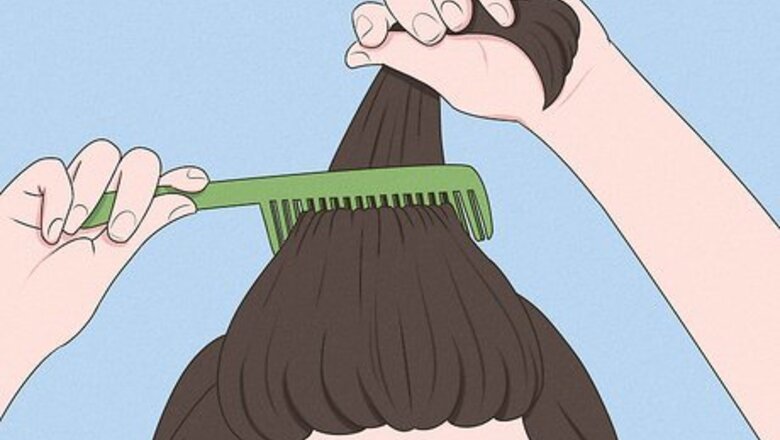
views
X
Research source
- Most hairstyles in the Edwardian era had a lot of volume, so you might want to start by teasing or backcombing your hair, especially if it's fine or thin.
- Recreate an iconic Edwardian look with a rolled updo known as the Gibson Girl hairstyle, but give it a modern twist by making it messy.
- Show off your romantic side by creating a tucked braid, ponytail, or bun with the timeless Edwardian wrap and roll.
Creating the Gibson Girl
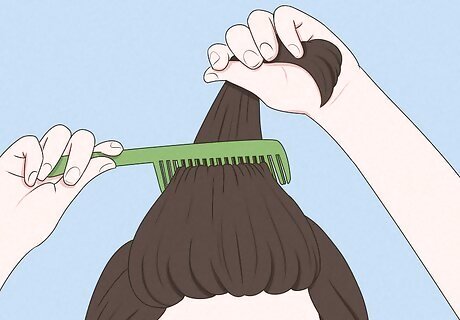
Backcomb or tease your hair to create volume. Scrunch some volumizing powder or mousse into your roots, then grab a teasing brush or boar bristle flat brush. Starting at your hairline, take a section of hair about the size of your brush and hold the ends up in the air. Lightly brush the hair back towards the root for 2-3 strokes. Work towards the back of your hair, repeating the process until all of your hair is teased. This teasing method is great for any updo, such as the Gibson Girl. If you’re starting with wet hair, blow-dry it upside down before adding volumizing mousse or powder. Teasing or backcombing may not be necessary if you naturally have very thick hair, but you’ll definitely want to add some volume if you have thin or normal hair.
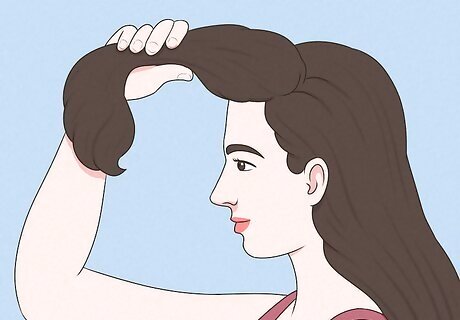
Separate the hair from your hairline in a thick band. Part your hair vertically on each side, right in front of the ears. Section off a 2-inch (5.08-centimeter) thick band of hair across your front hairline, running from ear-to-ear.
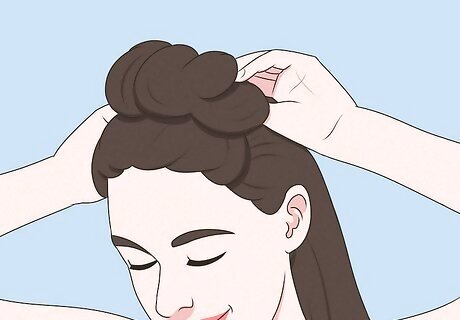
Gather the rest of your hair into a bun, except for the bottom layer. The bottom layer needs to curve in a 2-inch (5.08-centimeter) thick band along your back/bottom hairline. Secure the bun with a hair tie or hair clip. This bun is temporary; you will come back to it later. Save yourself some work later on and make a ponytail instead. Twist and secure the ponytail with a hairclip.
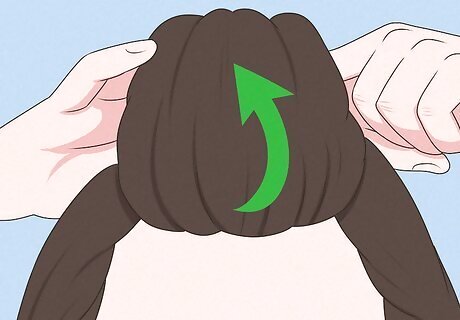
Roll the front section of your hair back, then pin it. Gather the sectioned-off hair from your front hairline. Use your forefingers to wind that hair backwards, then secure the roll with a bobby pin or two. The section needs to be the same length as your forefinger. Keep the roll loose. It should be big enough to comfortably fit both of your forefingers.
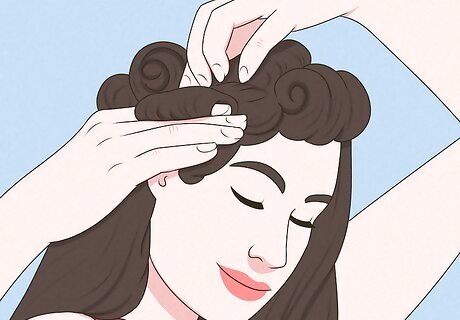
Repeat the process on the rest of your hairline. Continue working in finger-length sections around your hairline, including the temples and sides. Don't worry if a few wisps of hair come loose; this will give you a more romantic look that is suitable for the period. The nape will be a little tricky. Check your work in the mirror. Use a brush to smooth down the top your hair as you roll and pin.
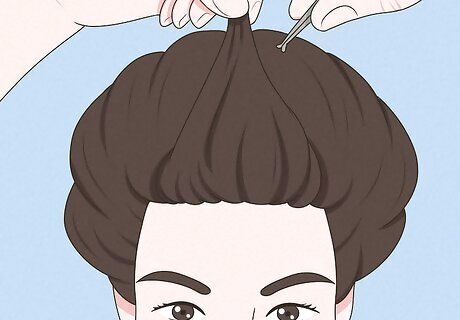
Sweep your bangs back and pin them, if needed. Pull your bangs back over the front roll, and gently pin them in place. Be careful not to squash the roll, however! Skip this step if you don't have bangs.
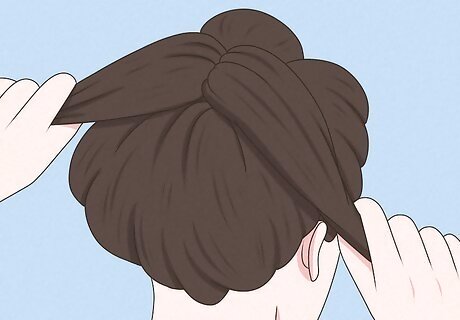
Turn the bun into a ponytail, then split it in two. Go back to the bun from the very beginning. Undo it carefully, so as not to disrupt the rolls, then re-tie it into a ponytail right in the center. Split the ponytail in half so that you have a left side and a right side. If you make a ponytail then clipped it into a bun earlier, simply remove the clip.
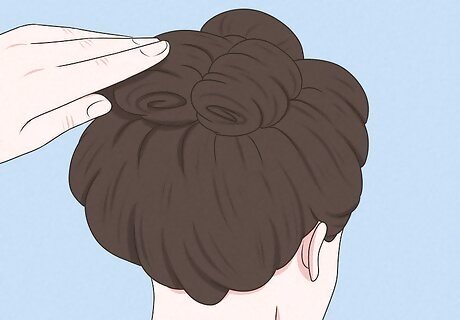
Roll, flatten, and pin each side of the ponytail towards the center. Take the left side of the ponytail, and roll it towards the center. Press the roll flat, and pin it just above the ponytail. Repeat the process for the right, but pin it just below the ponytail.
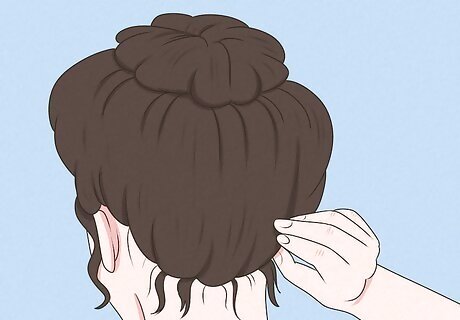
Loosen the style, if needed. Gently tug out a few wisps of hair around your hairline, especially at the temples, nape, and side burns. To make the style last longer, set it with hairspray.
Styling the Wrap and Roll
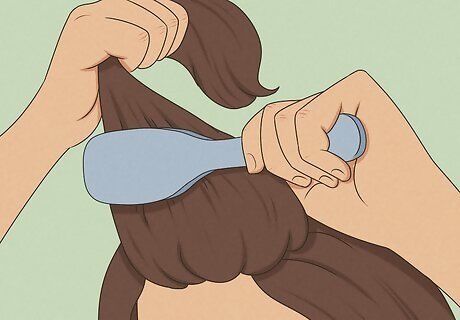
Backcomb your hair to create volume. Scrunch some volumizing powder or mousse into your roots, then grab a teasing brush or boar bristle flat brush. Starting at the front of your hairline, take a section of hair about the size of your brush and hold the ends up in the air. Lightly brush the hair back towards the root for 2-3 strokes. Work towards the back of your hair, repeating the process until all of your hair is teased. This may not be necessary if you naturally have very thick hair, but you’ll definitely want to add some volume if you have thin or normal hair.
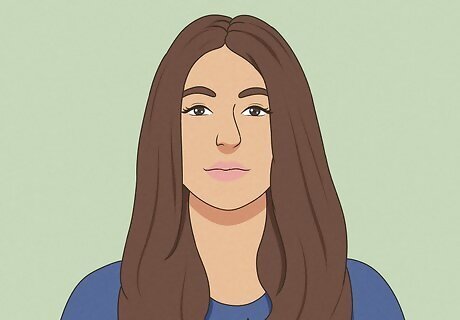
Start with long hair that's parted down the middle. This style looks like a rolled and tucked bun, except that the roll is more pronounced. The longer your hair is, the more voluminous the style will be. For best results, your hair should fall well past your shoulders.
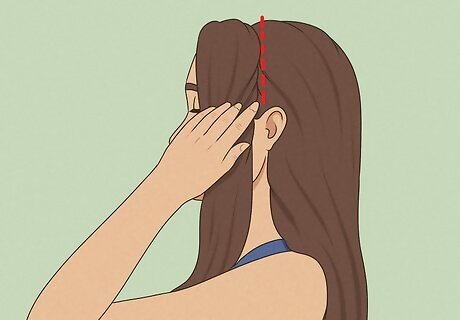
Section off the front part of your hair. Use your thumbs to separate the hair that's in front of your ears from the rest of your hair. The sections need to extend from your sideburns all the way up to the center part. Drape these sections over your shoulders and brush the rest of the hair back.
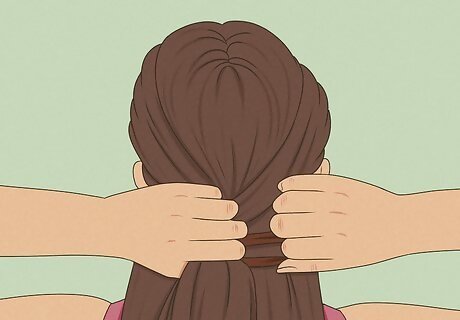
Tie the two sections behind your head in a loose ponytail. The ponytail needs to sit at about ear-level. Keep it loose enough so that you can still tuck your fingers behind it, but tight enough so that it doesn't droop down. Use a mini hair tie that matches your hair color or a clear hair elastic to secure it.
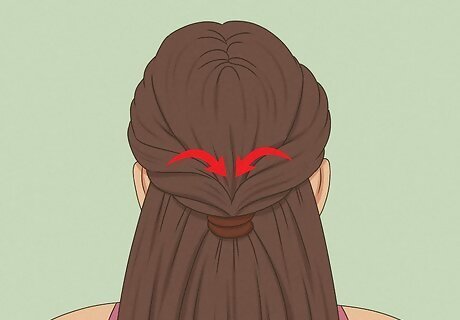
Flip the ponytail a few times until the sides twist into ropes. Slide the ponytail away from your scalp slightly and use your thumb and forefinger to split the hair right above the ponytail. Pinch the ponytail, then pull it through the gap. Do this a few times until the tied hair sections become twisted.
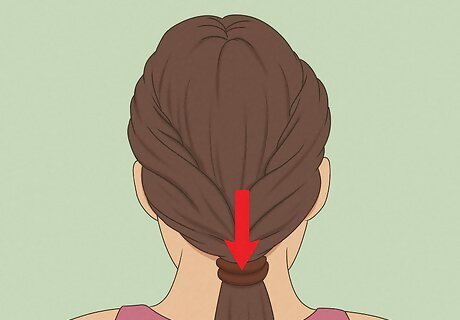
Pull the front of your hair down and across your head into a ponytail. Make this a loose, low ponytail, and secure it just below the first ponytail with a hair tie that matches your hair color. Keep the ponytail loose enough so that you can slide your finger behind it.
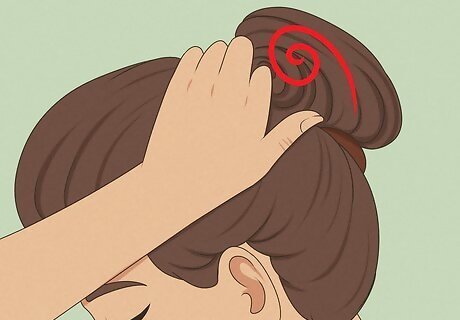
Flip the ponytail once or twice. Slide your finger up through the ponytail, right behind the hair tie; you want your finger between your head and the actual hair tie. Hook your finger around the ponytail, then slide it down through the hole. Tug down enough so that the ponytail comes out of the hole, but not the hair tie. If you have long, thin hair, you may need to do this twice.
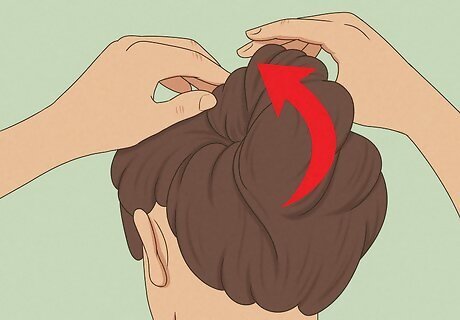
Roll the ponytail upwards. Gather and smooth your ponytail. Rotate it around your two forefingers as you roll it upwards towards your head. Keep the roll loose enough so that your forefingers can rotate freely inside of it. You want it to have a slight, oval shape, o that it extend above the initial roll from the previous step.
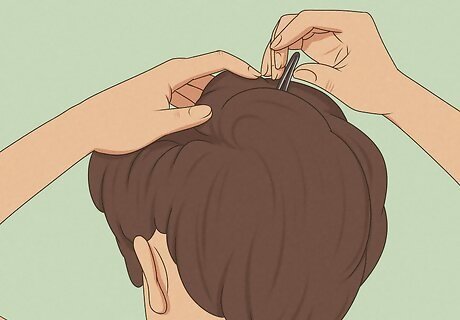
Secure the roll to your head with bobby pins. Make sure that you are only pinning the underside of the roll so that it is nice and voluminous. You will need at least two bobby pins, one on each side of the top of the roll. If you have thick, heavy hair, you may need another set or two of bobby pins along the sides.
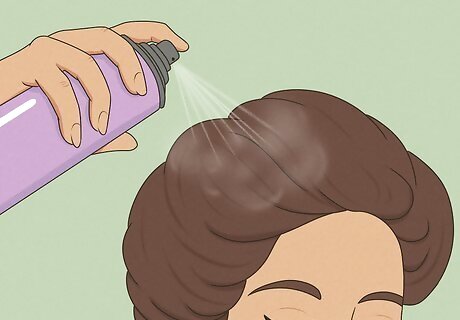
Set the style with hairspray, if desired. You don't have to do this, but you can if you want to. Hairspray will help the style last longer, but skipping the hairspray will be more authentic to the period. In fact, a few loose strands will give you a wispy, romantic look that's perfectly suitable.
Doing an Adaptable Hairstyle
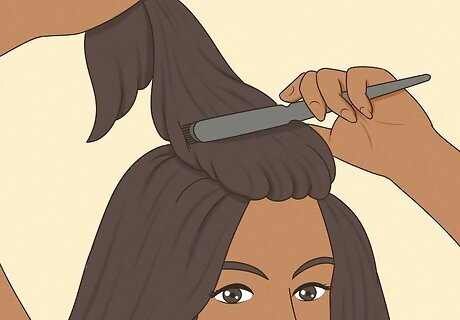
Backcomb or tease your hair if you need to add volume. First, apply a small amount of volumizing powder or mousse to your roots. Starting at the front of your hairline, take a section of hair about the size of your brush and hold the ends up in the air. Using a teasing brush or a boar bristle flat brush, lightly brush the hair back towards the root for 2-3 strokes. Work back towards the nape of your neck, repeating the process until all of your hair is backcombed. You may be able to skip this if you naturally have very thick hair, but you’ll definitely want to add some volume if you have thin or normal hair.
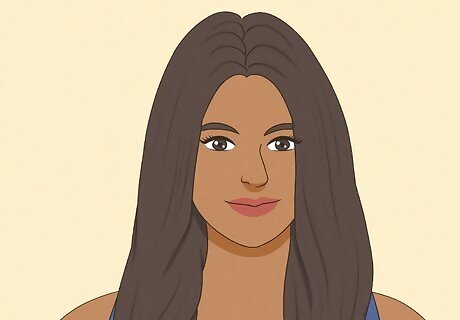
Start with long hair, parted down the center. This method will show you how to do three simple Edwardian hairstyles. They all start out the same way, but end different on the final step. In order for these hairstyles to work, your hair should fall well past your shoulders.
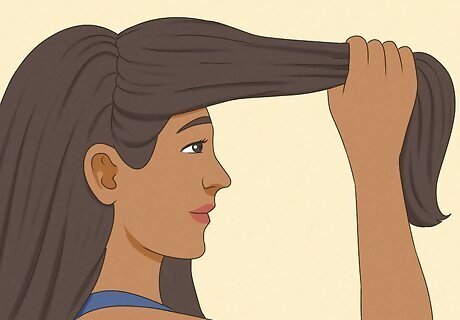
Gather a section of hair in front of each ear. The sections should extend from your side burns up to your hairline. Keep the sections relatively thin, about 1-inch (.54 centimeter) thick.
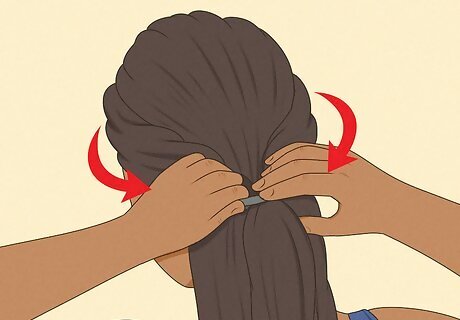
Tie the sections into a loose ponytail behind your head. Use a clear elastic or a hair tie that matches your hair color;. Make sure that ponytail is loose enough to drape under the curved part of your head, right above the nape.
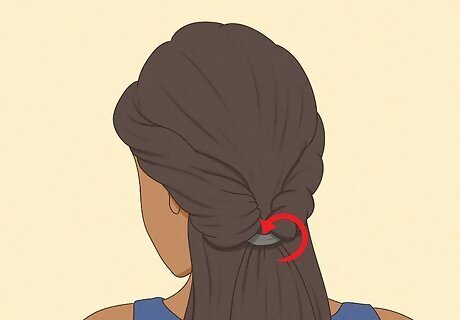
Twist the ponytail a few times. Slip your fingers behind the tied section and grab the ponytail. Pull it down through the hole, just like making a flipped or topsy-turvy ponytail. Do this a few times until the tied sections are twisted into ropes, all the way up to your hairline.
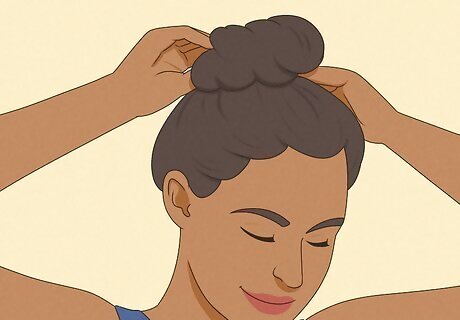
Finish off with a braid, flipped ponytail, or tucked bun. This is where the magic of this adaptable hairstyle occurs! Gather all of your hair, including the twisted ponytail, and everything beneath it. Next, finish your style by doing one of the following: Braid: split your hair into three sections, with the tied ponytail in the middle section. Braid your hair down, then secure it with a hair tie. Flipped ponytail: Make a ponytail that's level with the twisted ties. Poke your finger up through your hair, behind the hair tie. Grab the ponytail, and pull it down through the hole. Tucked bun: Do a flipped ponytail, but keep flipping it until you run out of hair. Tuck the ends into the hole, then secure them with bobby pins.
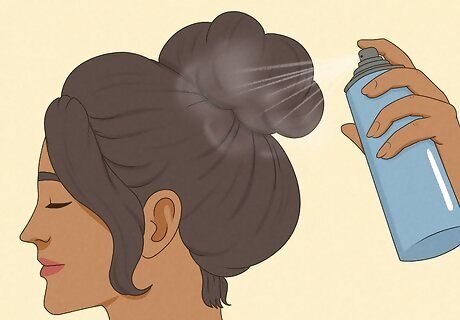
Set your style with hairspray, if desired. If you really want to get authentic, you can skip this step. If you want to keep your style looking smooth throughout the day, however, lightly mist it with hairspray.

















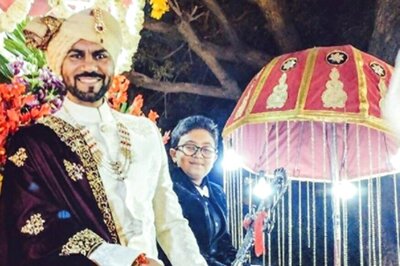

Comments
0 comment